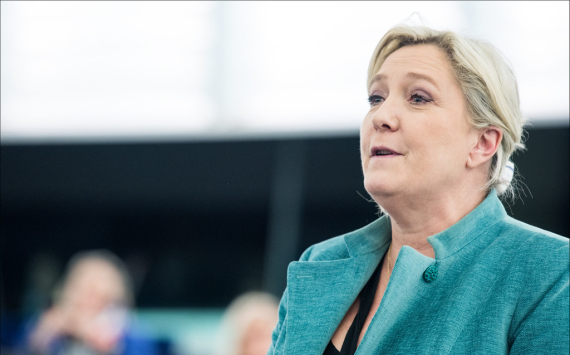Description
The National Rally, known as the National Front from 1972 to 2018, is a French far-right political party, described as right-wing populist and nationalist. It is the single largest parliamentary opposition party in the National Assembly since 2022. Its candidate was defeated in the second round in the 2002, 2017 and 2022 presidential elections. It opposes immigration, advocating significant cuts to legal immigration, protection of French identity, and stricter control of illegal immigration. The party advocates a "more balanced" and "independent" French foreign policy, opposing French military intervention in Africa while supporting France leaving NATO's integrated command. It also supports reform of the European Union (EU) and its related organisations as well as economic interventionism, protectionism, and zero tolerance for breaches of law and order.
The party was founded in 1972, created by the Ordre Nouveau to be the legitimate political vehicle for the far-right movement. Jean-Marie Le Pen was its founder and leader until his resignation in 2011. While its influence was marginal until 1984, the party's role as a nationalist electoral force has grown considerably. It has put forward a candidate at every presidential election but one since 1974. In the 2002 presidential election, Jean-Marie Le Pen advanced to the second round but finished a distant second in the runoff to Jacques Chirac. His daughter Marine Le Pen was elected to succeed him as party leader in 2012. She temporarily stepped down in 2017 in order to concentrate on her presidential candidacy; she resumed her leadership after the election. She headed the party until 2021, when she temporarily resigned again. A year later, Jordan Bardella was elected as her successor.
The party has seen an increase in its popularity and acceptance in French society in recent years. It has been accused of promoting xenophobia and antisemitism. While her father was nicknamed the "Devil of the Republic" by mainstream media and sparked outrage for hate speech, including Holocaust denial and Islamophobia, Marine Le Pen pursued a policy of "de-demonisation" of the party by softening its image and trying to frame the party as being neither right nor left. She endeavoured to extract it from its far-right roots, as well as censuring controversial members like her father, who was suspended and then expelled from the party in 2015. Following her election as the leader of the party in 2011, the popularity of the FN grew. By 2015, the FN had established itself as a major political party in France. Sources traditionally label the party as far-right. However, some media outlets have started to refer to the party as "right-wing populist" or "nationalist right" instead, arguing that it has substantially moderated from its years under Jean-Marie Le Pen.
At the FN congress of 2018, Marine Le Pen proposed renaming the party Rassemblement National (National Rally), and this was confirmed by a ballot of party members. Formerly strongly Eurosceptic, the National Rally changed policies in 2019, deciding to campaign for a reform of the EU rather than leaving it and to keep the euro as the main currency of France (together with the CFP franc for some collectivities). In 2021, Le Pen announced that she wanted to remain in the Schengen Area, citing "an attachment to the European spirit", but to reserve free movement to nationals of a European Economic Area country, excluding residents of and visitors from another Schengen country.
Le Pen reached the second round of the 2017 presidential election, receiving 33.9% of the votes in the run-off and losing to Emmanuel Macron. Again in the 2022 election, she lost to Macron in the run-off, receiving 41.45% of the votes. In the 2022 parliamentary elections, the National Rally achieved a significant increase in the number of its MPs in the National Assembly, from 7 to 89 seats. In June 2024, the party, led by its president Jordan Bardella, won the European Parliament elections in a landslide with 31.4% of the votes. This caused Macron to announce a snap election to try to garner more support for his party, Ensemble. Later that month, an RN-led right-wing coalition topped the first round of the snap French legislative election with a record 33.2% of the votes. On 7 July, the RN also won the popular vote (37.06%) in the second round of the snap election, but only won the third highest number of seats.
























